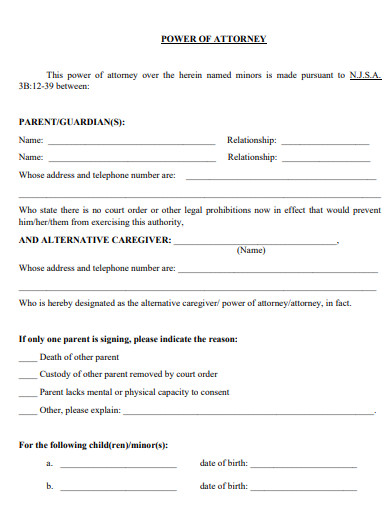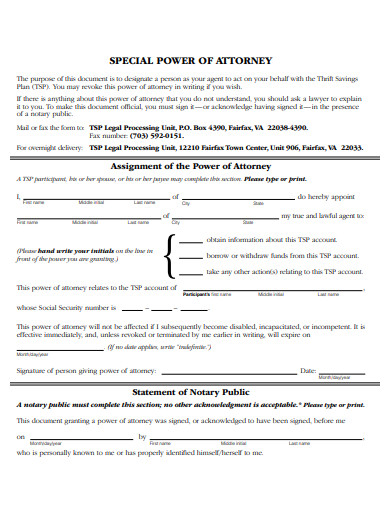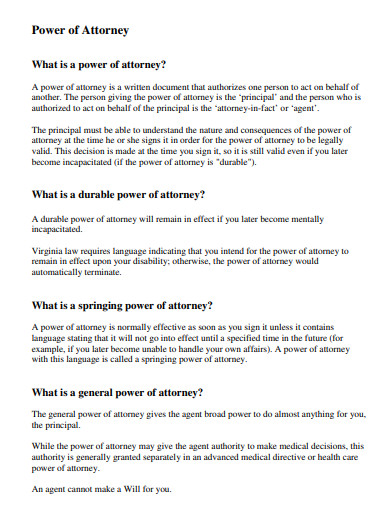Legally, a power of attorney can be used when a principal is unable to sign important documents because of an illness or disability that is short-term or long-term. For a variety of reasons, a power of attorney can be revoked, including the principal’s decision to revoke or their death, the agreement is ruled invalid by the court, or the agent is unable to perform the specified tasks. It’s possible that the consent won’t be valid if the couple who signed it gets divorced.
An individual’s ability to sign important documents may be jeopardized due to an illness or disability that may or may not last for an extended period of time. An agent’s authority can be revoked in several ways, including by the principal, by death, by a judicial ruling of invalidity, or by the agent’s inability to perform the tasks specified in the power of attorney. However, a power of attorney can be terminated if the agent is unable to carry out the tasks specified in the document. When a married couple decides to call it quits, the consent may no longer be valid because it was given by both parties.
5+ Legal Power of Attorney Samples
1. Legal Power of Attorney
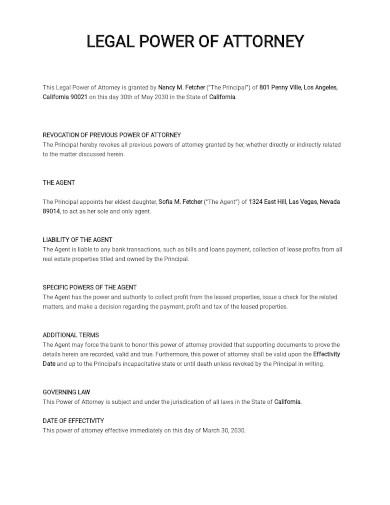
2. Legal Capacity Power of Attorney
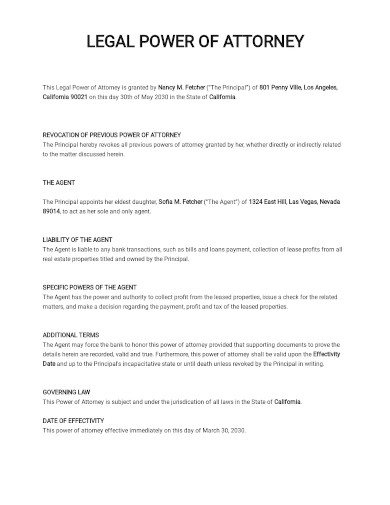
3. Legal Aid Power of Attorney
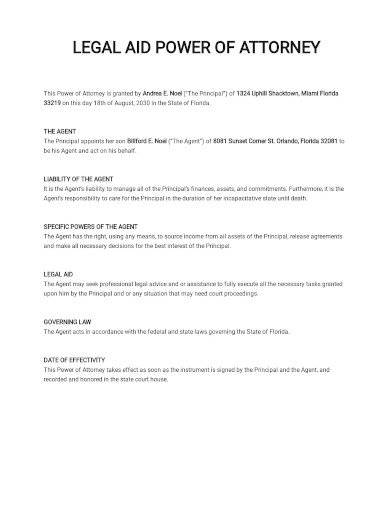
4. Sample Legal Power of Attorney
5. Legal Special Power of Attorney
6. Legal Power of Attorney Example
What Is a Legal Power of Attorney?
Where permitted by law, a power of attorney in business gives its agent broad authority to act on behalf of its principal. The agent may be given the authority to handle the principal’s bank accounts, sign checks on the principal’s behalf, sell property, manage assets, and file taxes on the principal’s behalf in this type of arrangement. The agent may also be responsible for selling real estate and managing assets.
Writing a Legal Power of Attorney
However, even though you have given someone the authority to act on your behalf, this does not mean that you are no longer able to make your own decisions or take action. Both of these things are possible, in fact. However, even if the two of you have differing views on the situation, you are ultimately in charge of making the final decision. Consult an attorney before attempting to write a letter granting permission to the power of attorney. This will save you a lot of time and effort in the long run. Alternatively, you can write the letter by following the steps outlined below:
- Come up with a draft
The first step is to list all of the abilities that your Agent will have. This should be the first step you take. It’s important to be clear about what your Agent will be responsible for because each account, property, and transaction is distinct. This is because they will be under the supervision of your Agent. - Make decisions about springing powers
It all boils down to whether or not it can be reinstalled on its own accord. The Agent can’t use these powers until a specific event occurs or a set of conditions is met. If either of these conditions is met, the Agent will not be able to use these abilities Unless a condition or event occurs, the Agent is not permitted to act on your behalf until the condition or event occurs. It doesn’t matter what kind of power you’re using because your letter has a provision for the power you’re looking for. As soon as you sign, your letter will be effective. - Choose your agent and successor
The most critical part of writing this letter is deciding on a representative. In order to proceed, you must have complete faith in the Agent you select. In the event that your first choice is unavailable, it is strongly recommended that you select a replacement agent. - Add the expiration date
It is critical that you make it clear in the letter that the permission you are giving to your Agent is only valid for a predetermined period of time. There is a “durable power of attorney” that can be used in cases where you want the power of attorney to be valid even if you are deceased. Even if you lose your ability to move, the repercussions of your actions will follow you. Regardless of the type of letter, you’re writing, remember that your power will fade away when you die. - Finalize the document
You can begin writing your letter as soon as you’ve gathered all of the necessary details. Use language that is simple to understand when discussing the content of the document. Send a letter with your full name, your agent’s full name, and your successor agent’s full name on it. You must also include the letter’s date of origin.
FAQs
What is the difference between the power of attorney and a letter of authorization?
Both letters, despite being written for very different reasons, have a lot in common. Someone else’s authority can be represented by a letter of authority. The person who was given the letter of authority has the responsibility of officially closing the document once the tasks outlined in it have been completed. The power of attorney authorization letter, on the other hand, gives the assignee broad powers.
What is the best form of power of attorney?
A general power of attorney or a more specific one can be drafted. Agents who have been granted general powers of attorney can make a wide range of decisions on behalf of their clients. If you want the person in charge of your care and finances to have as much freedom as possible, this is the best option.
Who can override power of attorney?
It is possible for one person (the agent) to make decisions on behalf of another person (the principal) thanks to a legal document known as a power of attorney (POA) (the principal). If the person who granted the power of attorney is still of sound mind, they can revoke it.
For a variety of reasons, you may not be able to perform certain actions yourself, but with the help of an authorization letter from your power of attorney, you can. If the main account holder has a valid reason for not being able to act, a power of attorney is required. This is true for bank accounts, properties, and brokerage accounts. Even if the account has more than one owner, this rule applies. Use any of the letters of authorization for powers of attorney given in this post if you ever need one, and be confident in your decision.
Related Posts
FREE 5+ Lease Power of Attorney Samples in PDF
FREE 10+ Property Power of Attorney Samples in PDF | MS Word | Google Docs
FREE 6+ Special Power of Attorney Samples in PDF
FREE 5+ Business Power of Attorney Samples in PDF
FREE 10+ Health Care Power of Attorney Samples in PDF | MS Word | Google Docs
FREE 6+ Company Power of Attorney Samples in PDF
FREE 5+ Affidavit of Desistance Samples [ Case, Settlement, Claim ]
FREE 10+ Affidavit of Funeral Expenses Samples [ Claim, Cost, Benefits ]
FREE 6+ Affidavit of Translation Samples in PDF
FREE 2+ Supporting Deposition Samples in PDF | MS Word
FREE 9+ Sample Orders to Appear in PDF
FREE 5+ Mortgage Deed Samples & Templates in PDF
FREE 13+ General Power of Attorney Templates in PDF | MS Word
FREE 19+ General Affidavit Samples and Templates in PDF
FREE 9+ Patent Assignment Samples and Templates in PDF

